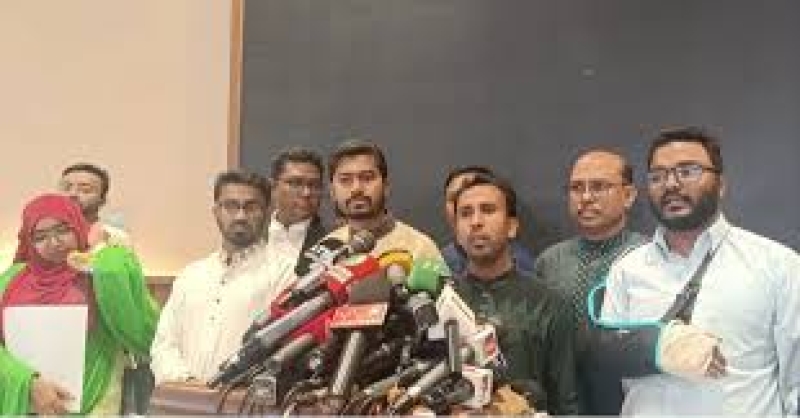- CA Yunus pays homage to Liberation War martyrs on Victory Day |
- Bangladesh capital market extends losing streak for second day |
- Bangladesh celebrates Victory Day Tuesday |
- 'Different govts presented history based on their own ideologies': JU VC |
Reforms should come through referendum: Nur

Gono Odhikar Parishad President Nurul Haque Nur on Monday said the agreed reform proposals should be implemented through a referendum under the current interim government to sustain and validate the reforms.
“In order to make these things sustainable or to avoid any legal crisis in the future, we have called for the entire reform process to be finalised through a referendum,” he told reporters after his party’s talks with the National Consensus Commission.
A Gono Odhikar Parishad delegation, led by Nur, joined the discussion that began at 10:15am with National Consensus Commission Vice Chairman Prof Ali Riaz in the chair at the LD Hall of the Jatiya Sangsad Bhaban.
Nur said they want the next general election to be held under a new system and the current government.
“So, we want the reforms to be implemented under this government,” he added.
In reply to a question, he said if a plebiscite is required to legally validate the reforms, the referendum must be conducted under the current government.
“In that case, there is no scope to hold a referendum along with the national election,” Nur added.
“If there is a process to accept the reforms or a referendum to give them legal validity, it should be done now. There is no scope to hold a referendum simultaneously with the national election,” he said.
During his opening speech at the dialogue, Nur also said the reform proposals finalised through dialogue must be implemented by the current interim government, no matter what.
“At any cost, the reforms agreed upon through discussions must be implemented under this government,” he said.
He said all parties must remain committed and strongly pursue the implementation of effective reforms in the greater interest of the country and the people.
“In the case of reforms, national interest and the country should be given priority over personal benefits or the interests of any party or group. This is our appeal to the commission,” he added.
Gono Odhikar backs bicameral parliament with 4-year tenure, 2-term limit for PM:
Nur told reporters that his party supported the proposed bicameral parliament with a four-year tenure, a two-term limit for the Prime Minister, changes to Article 70 of the Constitution, and the formation of a National Constitutional Council (NCC).
He said a person should not be allowed to serve as Prime Minister for more than two terms, whether consecutively or over a lifetime.
Regarding Article 70 of the Constitution, which bars an MP from voting against their party in Parliament, he said they supported the proposal to lift this bar—except in cases involving constitutional amendments, the finance bill, and votes of confidence.
On the formation of the NCC, he said the Bengali name should be ‘Jatiya Sangbidhanik Parishad’, replacing the word ‘Council’ with ‘Parishad’.
He also said they proposed replacing the word ‘pluralism’ with ‘religious harmony’ in the main principles of the Constitution.
Nur said they recommended that the tenure of the caretaker or election-time government could be four months.
Regarding local government bodies, he said they supported the proposal to establish a permanent and independent local government commission.
Consensus Commission members Safar Raj Hossain, Justice Emdadul Haque, Dr Badiul Alam Majumdar and Dr Iftekharuzzaman were present at the discussion moderated by Chief Adviser’s Special Assistant Monir Haider.
Gono Odhikar Parishad earlier agreed with 127 of the 166 proposals made by the Commission, partially agreed with 23, and disagreed with 15.
He said the party changed its opinions and agreed with eight more proposals. “So, we now agreed with a total of 135 proposals,” he said.
About the registration of a new political party, Nur said they suggested no party should be registered unless it doesn’t have active activities for a minimum of three to four years.
On March 20 last, the Consensus Commission opened a series of talks with political parties to forge a national consensus on state reform initiatives.
With Gono Odhikar Parishad, the Consensus Commission held discussions with 20 political parties, including BNP, Bangladesh Jamaat-e-Islami, and the National Citizen Party (NCP).
Formed on February 15, 2025, under the leadership of Chief Adviser Prof Muhammad Yunus, the Commission was tasked with shaping a unified national stance on critical reforms, reports UNB.

